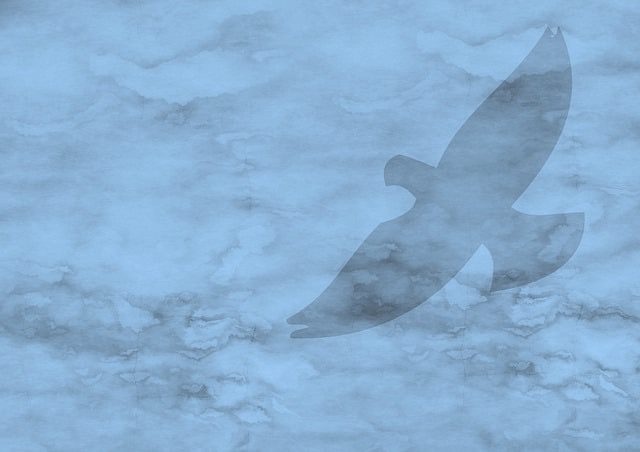You Are My Hiding Place
“He will cover you with his feathers.
Psalm 91:4 NLT
He will shelter you with his wings.
His faithful promises are your armor and protection.”

“Create in me a clean heart, O God.
Psalm 51:10-12 NLT
Renew a loyal spirit within me.
Do not banish me from your presence,
and don’t take your Holy Spirit from me.
Restore to me the joy of your salvation,
and make me willing to obey you.”
Have you ever messed up? I mean, really messed up? King David did. He committed some pretty big sins. And in response to being confronted about them, he wrote Psalm 51. This past Sunday was Pentecost, the day Christians celebrate the coming of the Holy Spirit to Jesus’ disciples, so it’s verse 11 that stands out to me right now: “Do not banish me from your presence, and don’t take your Holy Spirit from me.”
When I read those words in preparation for this week’s post, it got me thinking: Could that really happen? Obviously, David seemed worried. Should we be worried, too? As Christians, if we commit a bad enough sin, could we lose access to God? Would He banish us from His presence and withdraw His Spirit from us? These are very disconcerting questions. Let’s see what we can learn from David’s story…
Our plan for 2023 is to journey through The NeverEnding Story of the Bible and discover how we fit into it along the way. Our plan for this year is loosely based on The Story, an abridged chronological version of the Bible, and the accompanying study guide The Heart of the Story by Randy Frazee.
Here is where we are in The Story:
MOVEMENT TWO: The Story of Israel (Genesis 12-Malachi)
Chapter 12 – The Trials of a King
This chapter in The Story includes 2 Samuel 11-12, 18-19; 1 Chronicles 22, 29; and Psalms 23, 32, 51. This week, we will focus on the story of David and Bathsheba in 2 Samuel 11-12. Specifically, we will look at how David reacted when the prophet Nathan confronted him about his sins of adultery and murder. Before we get there, however, let’s back up a bit.
When we left David last week, he was still a boy, a boy who had just been anointed as the future king of Israel. And a boy who had just brought down a giant. David’s faith in God gave him the courage to confront and defeat Goliath when no one else was willing to try. Was it David’s faith alone that allowed him to accomplish such a feat? Certainly, his faith was strong, but in 1 Samuel 16:13 (NLT), we read that David also gained an important Ally the day he found out he would become king: “Samuel took the flask of olive oil he had brought and anointed David with the oil. And the Spirit of the Lord came powerfully upon David from that day on.”
Let’s also look at the next verse: “Now the Spirit of the Lord had left Saul, and the Lord sent a tormenting spirit that filled him with depression and fear” (1 Samuel 16:14 NLT).
No wonder David was worried. God had rejected Saul as king after Saul’s sinful acts. Would He now reject David and withdraw His Spirit from him as well? As the musician appointed to soothe Saul, David was well aware of the emotional suffering Saul had endured. And later, David even became the target of it. Saul had grown so paranoid and jealous of David that David was forced to flee and live in hiding for years. In fact, David wrote Psalm 142, a prayer for mercy and rescue, while hiding in a cave. I’m sure at the time David wondered what God was doing. But David remained faithful — to God and to his king — and trusted that God had a plan. As Psalm 142:5 declares, God was his refuge.
“David was anointed king of Israel as a young boy. He would not be inaugurated king until after fourteen years of being chased by King Saul like a fugitive. God uses this long season to grow David’s dependency on him. God often brings us through difficult seasons to prepare us for bigger challenges ahead.”
Randy Frazee, The Heart of the Story

“I love you, Lord;
Psalm 18:1-2 NLT
you are my strength.
The Lord is my rock, my fortress, and my savior;
my God is my rock, in whom I find protection.
He is my shield, the power that saves me,
and my place of safety.”
David knew God would fulfill His promises to him, so he trusted God to protect him. The years he spent running from Saul taught David to rely solely on God as his shelter and his source of strength. He wrote Psalm 18 in response to God’s faithfulness during this difficult time in his life. These trials, though difficult, bolstered his already robust faith to such an extent that nothing could shake it. Not even David’s own sins. To see David’s faith in action, let’s compare Saul’s and David’s reactions to being confronted after their mistakes…
Here is Saul’s reaction after Samuel rebuked him for presenting the burnt offering at Gilgal:
“Saul replied, ‘I saw my men scattering from me, and you didn’t arrive when you said you would, and the Philistines are at Micmash ready for battle. So I said, “The Philistines are ready to march against us at Gilgal, and I haven’t even asked for the Lord’s help!” So I felt compelled to offer the burnt offering myself before you came.'”
1 Samuel 13:11-12 NLT
Here is Saul’s reaction after Samuel rebuked him for failing to carry out the Lord’s instructions to completely destroy the Amalekites:
“‘But I did obey the Lord,’ Saul insisted. ‘I carried out the mission he gave me. I brought back King Agag, but I destroyed everyone else. Then my troops brought in the best of the sheep, goats, cattle, and plunder to sacrifice to the Lord your God in Gilgal.'”
1 Samuel 15:20-21 NLT
Here is David’s reaction after Nathan rebuked him for his sin with Bathsheba:
“David said to Nathan, ‘I have sinned against the Lord.'”
2 Samuel 12:13 ESV
Saul seemed to be quick to justify his actions and give excuses. And I can’t help but notice Saul’s reference to “the Lord your God” in 1 Samuel 15:21 — not my God or our God, but your God. He refers to God this way again in verse 30. This seems to indicate that Saul’s relationship with the Lord wasn’t exactly close or personal. Like David, Saul had received the Holy Spirit when he was anointed (see 1 Samuel 10:10). But by the time God withdrew His Spirit from Saul, it sounds like Saul had already withdrawn himself from God.
David, on the other hand, was a man after God’s own heart (see 1 Samuel 13:14 and Acts 13:22). Time and time again, he demonstrated a strong personal faith in the Lord. And when he was confronted by Nathan, David didn’t make excuses. He simply confessed: “I have sinned against the Lord.” Even though he would face devastating consequences as a result of his actions, David immediately turned back to God:
“Have mercy on me, O God,
Psalm 51:1-2 NLT
because of your unfailing love.
Because of your great compassion,
blot out the stain of my sins.
Wash me clean from my guilt.
Purify me from my sin.”
This is where David’s character shines. And this is the lesson we can learn from him: No matter how badly we stumble, we can always turn back to God. When we confess and renounce our sins, God promises to forgive us and cleanse us of unrighteousness (see 1 John 1:9). After David confessed his sin, God forgave him (see 2 Samuel 12:13). God did not reject him or remove His Spirit from him.
Did David have cause to be concerned? Yes. Before Jesus came, the Holy Spirit was not guaranteed. He came upon certain believers for specific tasks, but He did not indwell them as He does believers today. As Christians, we cannot lose the Holy Spirit. When we became believers in Christ, we received salvation and were sealed as God’s own with the gift of His Spirit (see Ephesians 1:13). It is the Holy Spirit who renews us and transforms us into Christ’s image, and He promises to carry on that work in us until the day Christ returns (see Philippians 1:6). So, we have no reason to fear! God will not reject us or remove His Spirit from us.
“God is more interested in how we respond to breaking the rules than in simply punishing us for disobeying. He wants to know what is in our hearts. Are we humble and teachable and willing to learn from our mistakes, or are we proud and defensive and oblivious to our need for God’s mercy and love?”
Randy Frazee, The Heart of the Story

“Maybe the reason David remains one of the most celebrated characters in God’s story is to highlight this message for ordinary people like you and me: If God can redeem a man who did something this awful and restore him to such a lofty position, imagine what he can do for us! Imagine what he can do through you for his kingdom.”
Randy Frazee, The Heart of the Story
David went on to be the greatest king in Israel’s history, and he was listed as one of the heroes of faith in Hebrews 11. Was he perfect? No. But he loved God with all his heart. He trusted God with every aspect of his life. And in times of trouble, he found refuge in the Lord.
“Then I acknowledged my sin to you
Psalm 32:5-7 NIV
and did not cover up my iniquity.
I said, “I will confess
my transgressions to the Lord.”
And you forgave
the guilt of my sin.
Therefore let all the faithful pray to you
while you may be found;
surely the rising of the mighty waters
will not reach them.
You are my hiding place;
you will protect me from trouble
and surround me with songs of deliverance.”
Psalm 32:7 has always been one of my favorite verses. I often find myself singing “You Are My Hiding Place,” a song based on this verse, whenever I could use some encouragement. But I never realized the context until I started working on this post. I always assumed it came from one of the psalms David wrote while hiding from his enemies. But it doesn’t. It comes from Psalm 32, a psalm he wrote in response to God’s forgiveness after his sin with Bathsheba. For me, that brings a whole new layer of meaning to David’s words. When we sin, it’s natural to want to hide from what we’ve done. But God invites us to hide ourselves in Him.
“Did you know that God is singing songs of deliverance all around you all the time? You can’t hear them because they’re outside your range of hearing, but you’re surrounded by a sonic shield. Those songs of deliverance are powerful enough to break any bondage, overcome any addiction, and solve any problem. Those songs are the reason no weapon formed against you will prosper.
Mark Batterson, Whisper
Remember, the voice can reproduce only what the ear can hear. I’m not sure what problem you need to solve or what issue you need to resolve, but my prayer is that you’ll learn to discern His voice. When you do, His songs of deliverance can set you free!
Quit hiding from God. Hide yourself in Him.”
This week’s Scripture passages focus on finding refuge, deliverance, and strength in the Lord. I have also included a video of “You Are My Hiding Place” at the end of this post. As we listen to the beautiful melody and powerful lyrics, my prayer is that we may be drawn closer to our Lord. For no matter the hardships we face or the sins we battle, we can always hide ourselves in the shelter of His wings.

“Long before the Holy Spirit filled or stirred or convicted or sealed or revealed or reminded, we find Him hovering over the surface of the deep. And He is still hovering over our lives the way He hovered over creation. He still speaks light into darkness. He still brings order out of chaos. He still makes beauty out of ashes.”
Mark Batterson, Whisper

References:
- Batterson, Mark. Whisper: How to Hear the Voice of God. Multnomah, 2017.
- Frazee, Randy. The Heart of the Story: Discover Your Life Within the Grand Epic of God’s Story. Zondervan, 2017.
- The Story: Read the Bible as One Seamless Story from Beginning to End. Rev. ed., Zondervan, 2008.
- “You Are My Hiding Place.” YouTube, uploaded by RENUNGANKU, 14 June 2020, https://youtu.be/ISW5xMKRdSU.
Images:
- Dove Flying featured image by Gerd Altmann from Pixabay (edited)
- Sky Background image by Joe from Pixabay (edited)
- Sheltering Wings image by Huu Luu from Pixabay (edited)
- Man in Sunlit Cave image by Pexels from Pixabay
- Diving Dove Shadow image by Inna from Pixabay (edited)
- Night Sky image by James Wheeler from Pixabay
- Sheltering Wings image in Scripture passages by 1820796 from Pixabay (edited)
- Hovering Dove Shadow image by Gerd Altmann from Pixabay (edited)